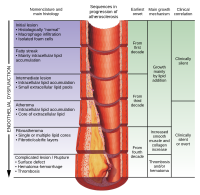
Photo from wikipedia
Type of funding sources: None. Heavy alcohol consumption is associated with increased risk of stroke, but its role, especially moderate drinking, in other types of cardiovascular disease (CVD) remains inconclusive.… Click to show full abstract
Type of funding sources: None. Heavy alcohol consumption is associated with increased risk of stroke, but its role, especially moderate drinking, in other types of cardiovascular disease (CVD) remains inconclusive. Understanding how alcohol intake affects cardiac traits measured by electrocardiogram (ECG) can improve our understanding of the relationships between alcohol intake and risk of different types of CVD. This study aims to assess the causal associations of alcohol and ECG-derived cardiovascular phenotypes in Chinese adults, where two genetic variants which alter alcohol metabolism and greatly affect alcohol intake can be used in a Mendelian randomisation approach. The prospective China Kadoorie Biobank recruited 512,715 adults from ten diverse regions in China between 2004-2008 and recorded baseline alcohol use and other characteristics. 151,035 participants were genotyped for two genetic variants that affected alcohol metabolism (ALDH2-rs671 and ADH1B-rs1229984), and 25,041 participants had ECG measurements taken at the 2013-2014 resurvey, broadly defined into phenotypes (ischaemia, left ventricular hypertrophy (LVH), arrhythmia) and continuous traits. Self-reported alcohol intake (conventional analysis) and genotype-predicted alcohol intake (genetic analysis) were related to the odds of ECG-derived cardiovascular phenotypes and the mean values of ECG continuous traits using multivariable logistic and linear regression models respectively. Among men, 35.0% drank alcohol regularly. There was a J-shaped association between ECG-defined ischaemia with self-reported alcohol intake, with a clear dose-response among current drinkers (OR 1.56, 95%CI 1.25-1.94 per 280g/week increase in alcohol intake (Figure 1)). However, there was no clear causal association in genetic analysis (1.02, 0.82-1.27 per 280g/week (Table 1)). There were no associations between alcohol intake and LVH or arrhythmia in conventional or genetic analysis. Among women, only 2.3% drank alcohol regularly, and there were no clear associations between alcohol intake and ECG measurements and derived phenotypes in either the conventional or genetic analyses. Genotype-predicted alcohol intake was associated with smaller P, QRS, and T-axis, and longer QRS and QTc duration in men, and marginally associated with ventricular rate in women. This study found no clear causal associations of alcohol with ECG-derived cardiovascular phenotypes and continuous traits, and no evidence of a cardioprotective effect of moderate drinking on myocardial ischaemia.
Journal Title: European Journal of Preventive Cardiology
Year Published: 2023
Link to full text (if available)
Share on Social Media: Sign Up to like & get
recommendations!